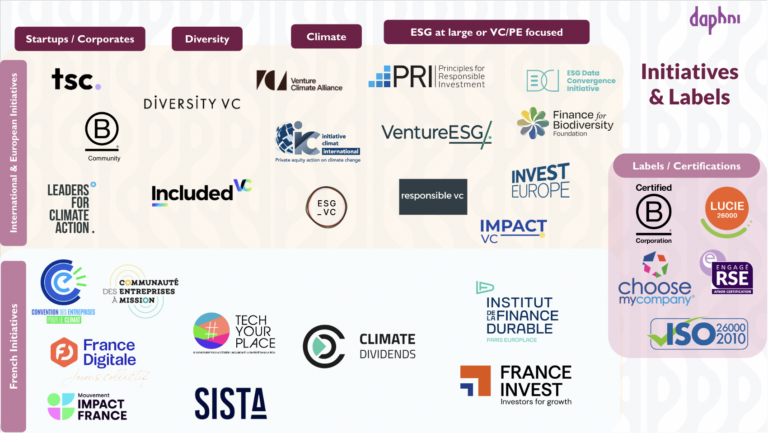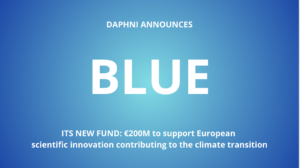ESG (Environmental, Social, and Governance) is an unavoidable topic in the VC world, and that’s excellent news! Integrating these criteria helps improve market practices and directs investments towards solutions beneficial to society and the planet.
Of course, there are detractors, but every good topic has its opponents! Despite the criticisms and backlash, ESG continues to bring together market players in Europe. Together, we face common challenges: increasingly demanding regulations, growing demand for information from investors, and the need to support entrepreneurs in their decarbonation and creation of extra-financial value.
A common approach to starting with ESG is to participate in initiatives, obtain a label/certification, or join working groups, whether formal or informal. These collective actions allow for structured and collaborative handling of the subject..
Misconception or real obstacles?
It’s a jungle of initiatives, and we feel overwhelmed by the number of choices: Lack of focus, time-consuming, limited results, costly… Committing to too many initiatives can rapidly become overwhelming and counterproductive, as it takes time and the results are not always there. Given limited human and financial resources, it is crucial to use them wisely.
What are the concrete benefits of participating in these initiatives?
– Adopting best practices: Initiatives help discover and adopt proven methods from various stakeholders (other funds in the ecosystem, investors, NGOs, or even corporates).
– Benefiting from frameworks and action plans: They provide ready-to-implement action plans or turnkey analysis frameworks on ESG.
– Exchanging and innovating: Sharing with peers helps identify common challenges and develop new approaches or practices together.
– Knowing the best tools: It’s an excellent way to source the best solutions on the market, especially for ESG reporting, regulation, and supporting portfolio companies in their sustainable journey.
Labels play a different role. They attest to the state of the art and progress by demonstrating that a third party has objectively examined a fund’s practices and that minimum thresholds have been exceeded. While they do not offer absolute guarantees, they do raise the bar on certain aspects.
In conclusion, without proper management of initiatives and labels, we run the risk of spending more time talking than acting, which must be avoided at all costs. Not participating would deprive us of a space for exchange and collaboration with our peers and market experts, especially the impact or ESG circles within various professional associations. Each fund has different needs and capabilities, which probably explains the diversity of options. However, there shouldn’t be dozens of memberships per fund; two or three initiatives are enough.
At Daphni, we reassess every 6 to 12 months the relevance of continuing to invest in certain initiatives.
Overview of Initiatives
Here is a non-exhaustive mapping of ESG initiatives and labels we have examined that can be relevant for a VC fund. They cover not only ESG in our investment and portfolio management practices but also the practices we implement internally, as a company ourselves.

To navigate this landscape effectively, we have thought about a draft categorization between initiatives, labels, and working groups that VC funds might consider participating in:
– Local initiatives: They offer a platform to discuss specific regulatory challenges in France that we face and that our portfolio companies face. They also help gather the expectations of national institutional investors on ESG issues.
– European and international initiatives: They provide a perspective on the challenges faced in other markets and help to understand ESG practices in the European and international ecosystem, whether for investment portfolios or investors.
– Labels and certifications: They provide assurance and attest to the achievement of a certain level of requirements and policies. The most demanding labels audit companies against multiple pieces of evidence to ensure the robustness of what is in place.
To conclude, our vision in two words
While this mapping does not list all available initiatives, each VC fund needs to explore the options that best fit its specific objectives and capabilities. At the end of the day, active participation in ESG initiatives will not only strengthen responsible investment practices, but will also contribute to a more transparent and sustainable market. In parallel, to be more effective, funds need to equip themselves with AI-integrated tools and solutions to save time on ESG reporting, regulation and supporting our startups on their sustainable journey. But that’s another topic…



